by Ruthanna Hutton-Okpalaeke, Urban Triage Agriculture Program Manager
Every morning, I start my day with a cup of tea, accompanied by a ritual that may seem surprising to many in the realm of agriculture. Instead of immediately tending to fields, my mornings often revolve around meetings, seminars, and computer work. While this isn’t my favorite aspect, I’ve come to recognize its pivotal role in enhancing crop production. Within these digital and collaborative spaces, I delve into learning innovative harvesting techniques, researching cost-effective yet safe pest deterrents for children, and crafting grant proposals aimed at advancing our agricultural practices and opportunities. It’s a unique blend of traditional farming values and modern technological integration that sets the stage for a productive day ahead.
Through advocacy, transformative education, collaboration, and connecting to nature, Urban Triage’s Supporting Healthy Black Agriculture (SHBA) workgroups address the root of health disparities and inequalities in our community while providing the space and opportunity for healing for Black families.
SHBA is a workgroup series designed to empower and inspire breakthroughs and transformation centering Black communities. Our workgroup teaches the basics of growing food and the entrepreneurial benefits/opportunities in the agriculture field. Our mission is to build sustainability back into agriculture while providing bonding time and healing space for Black families and opportunities for community members to learn about agriculture from the Black experience. To make our work more impactful, we dive into the many societal pressures that keep Black people from pursuing agricultural careers such as land access and culturally relevant training. Each participant who graduates from the program leaves with the skills they need to start their own garden, Urban Triage works to provide every participant who wishes to have one a garden set up of their own so they can put their new skills into practice.
One of my favorite memories from the program is when we had a young student who was 7 years old and afraid of spiders—we find quite a few in the garden. One day we identified all the insects we could find in the garden and a spider was caught in a bug net. We had Insect Ambassadors, a UW Graduate group, working with us that day. One of their graduate students took the spider out of the bug net, explained what they do in the garden, and assured that they can’t bite you. The boy asked to hold the spider in his own hand. At first he screamed with his hand fully extended, but he didn’t move. Eventually he calmed down to the point where he could get a good look at the spider before it hopped off his hand and into the grass. (Article continues below photos.)
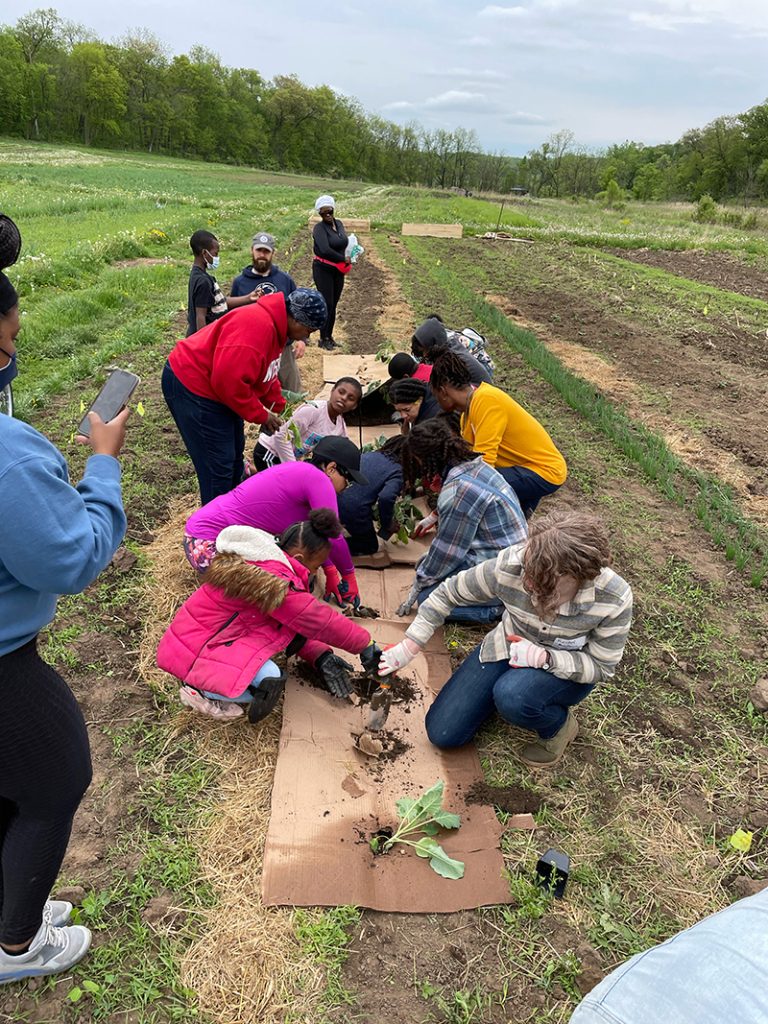
Planting collards into cardboard.
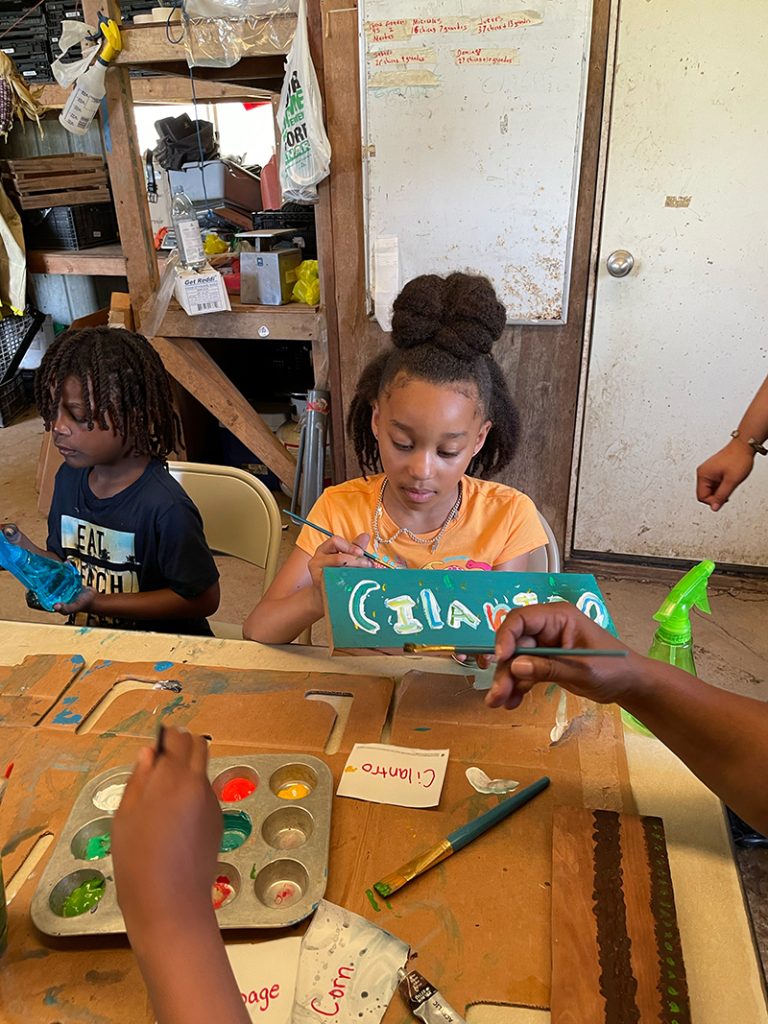
Painting signs for the field.
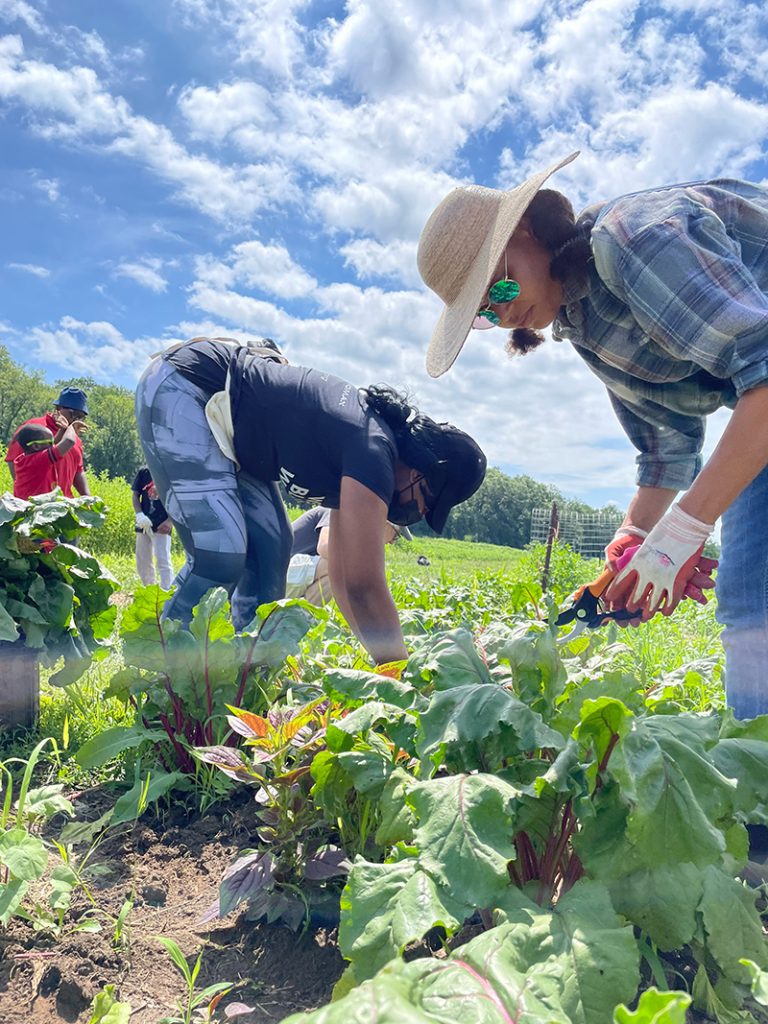
Weeding.
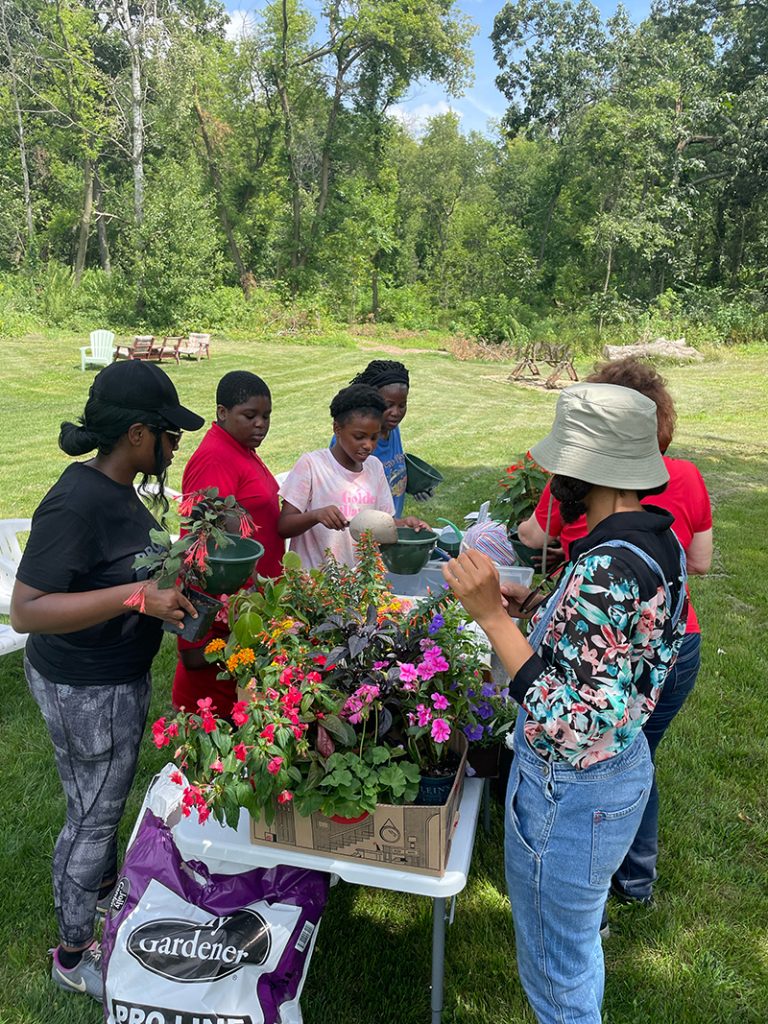
Flower workshop.
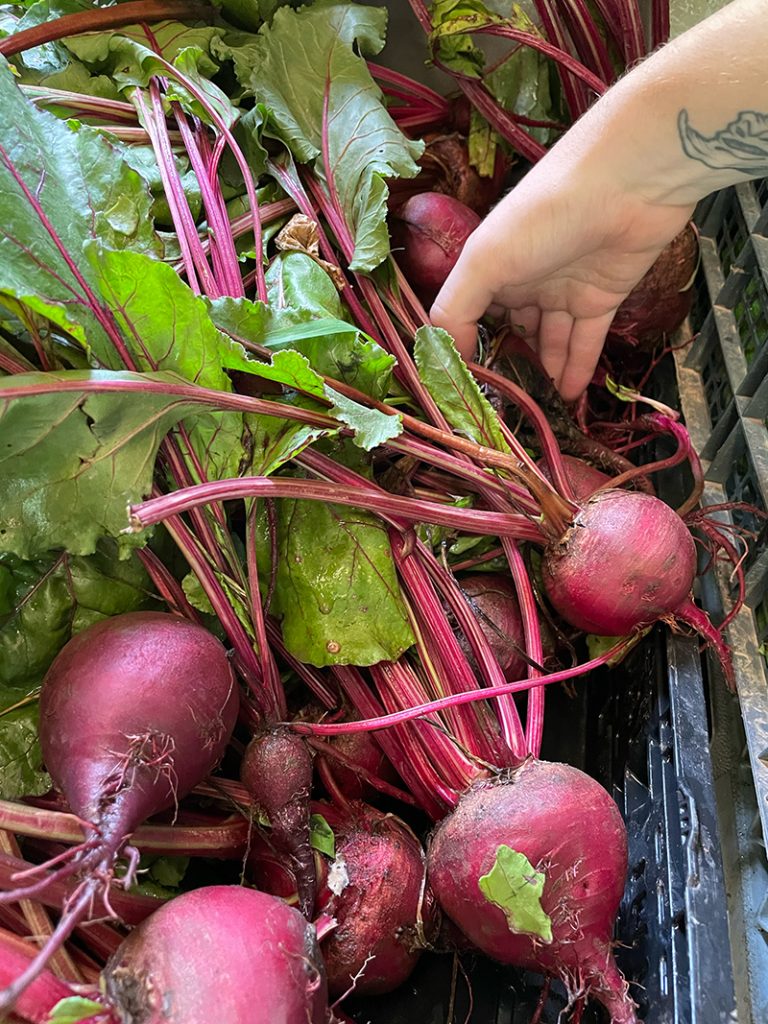
Harvested beets.
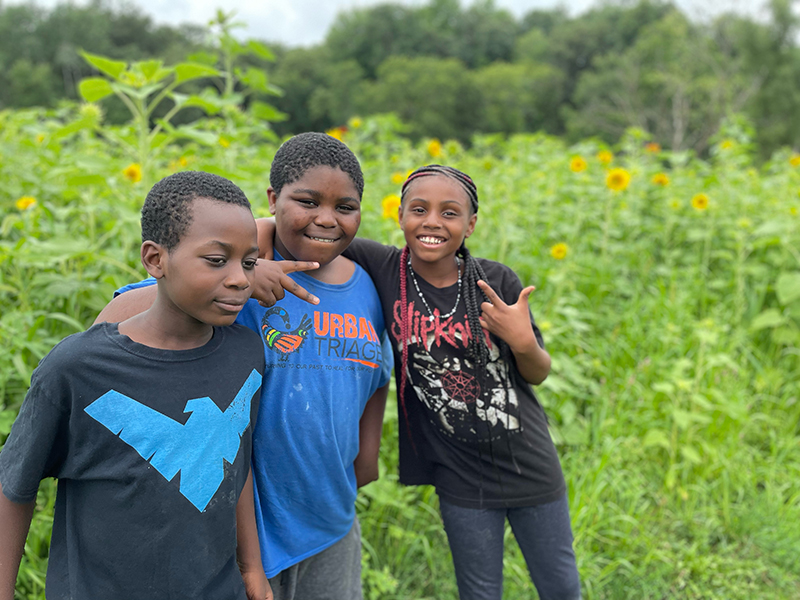
SHBA students in class.
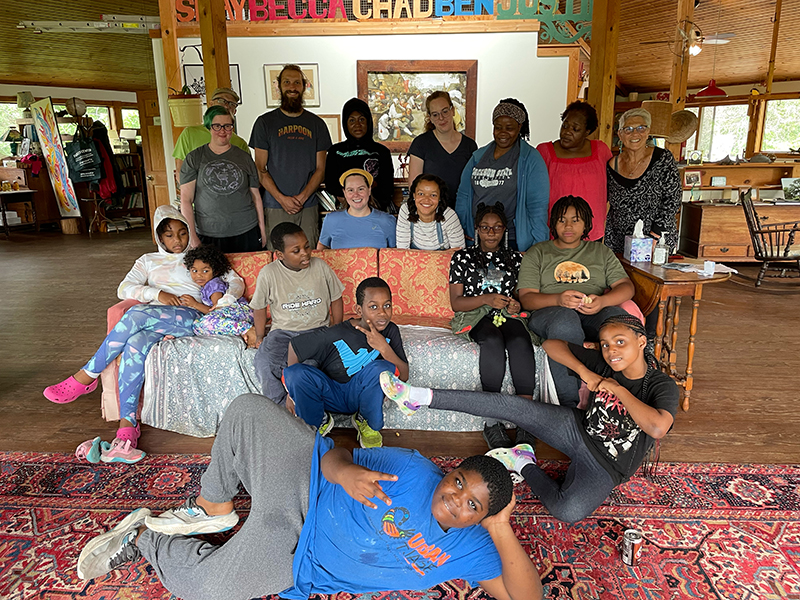
SHBA graduation.
Another one of my favorite stories from this program is when one of our participants asked if we could grow peanuts. She grew up in the south and loved boiled peanuts—something I’ve never seen in the midwest. My initial reaction was no, we couldn’t grow them. Oftentimes I find when you’ve been doing something for a while it narrows your capacity to see new possibilities. These fresh ideas in the garden made me think that I better do my research! As it happens, some people have been breeding cold-hardy peanut varieties that do well in our growing zone. So we have been growing peanuts for the last two seasons and plan to continue.
Supporting Healthy Black Agriculture is only one of Urban Triage’s programs. Urban Triage is a community-based nonprofit organization nestled in Madison’s south side and serves clients from all over Dane County, and it is dedicated to responding to its community’s immediate needs. Over the last three years, we have been expanding and refining our programs, driven by a mission to transform culture, institutions, and communities to ensure a humane future.
Our primary programs are Housing Navigation Services, designed to provide compassionate, caring, and culturally conscious services to individuals and families experiencing housing insecurity and homelessness. This, along with Unhoused Youth, works to address the challenges our unhoused community faces on a daily basis and offers paths to security and stabilization.
Urban Triage also offers community-centered work groups that address and work through the many systemic challenges in our communities. These programs are designed to create positive changes in the participants and help turn the anxiety and frustration these systems cause into manageable steps to make change.
Urban Triage Agriculture programs were born out of requests from clients wanting more accessible healthy food options, to increase food security as our clients found stabilization in other aspects of their lives. The pilot program to this request was Supporting Healthy Black Agriculture.
SHBA takes place at the Farley Center for Peace Justice and Sustainability, a nonprofit dedicated to promoting ecological sustainability, social justice, and peace. The Farley Center programs support new and beginning farmers with land access through their Incubator Farm, an ideal launching point for new farmers. They also offer beekeeping programs for adults and children. On the farm, they offer shared tools and equipment that help farmers determine what scale to work at and what they will need to get to their desired scale. These supportive services significantly lower the barrier to entry to starting an agricultural business making it more feasible to start.
This was an ideal location for Urban Triage to launch its agricultural programming. Being an accessible location in the city, it offered the flexibility for Urban Triage to launch its programming while modeling the steps Urban Triage’s participants can take to establish their own businesses. It also allows Urban Triage to experiment with their growing techniques in a collaborative environment with many other farmers. Creating the opportunity to harness decades of farming experience to refine their growing operations. Currently, Urban Triage is working to reduce tillage, a practice that minimizes and works to remove the need for annual or biannual tilling of fields while maintaining crop productivity. This practice reduces erosion and improves soil fertility all of which fosters a more regenerative farming system that requires fewer inputs and produces less waste.
The Farley Center also supports community involvement in local food systems by offering educational tours of their farm and using the space to support local artists and farmers simultaneously by hosting collaborative events throughout the year. At the close of their first season at the Farley Center, Urban Triage threw a celebratory Harvest Festival that is now held annually in September. This festival is for all community members to come to the farm and celebrate the land we work on and the history of Black and Indigenous people in agriculture. The festival offers soul food, a land blessing and acknowledgment, and hosts local dancers, singers, acrobats, and many other artists in a celebration of the land and our continued stewardship of it.
While SHBA helps community members get involved with and understand their local food systems there was a desire by previous participants to start agricultural businesses. This led to the creation of our Specialty Crop Program. This is a business-intensive course focusing on specialty crops. Covering all aspects of business, planning, execution, product branding, marketing, and managing your business to scale.
Farm Business Development grew from the launch of SHBA, a program designed to support existing Black Farmers in Wisconsin with support services. Less than 1% of Wisconsin’s over 60,000 farmers are Black according to census data and only make approximately $2,000 compared to $17,000 in farm income of the average white farmer. These statistics inform the need for supportive services for Black farmers to build stability and sustainability in their operations. Urban Triage supports Black farmers in finding grants, connecting to technical service providers, marketing, and other needs based on the client.
Urban Triage believes that everyone deserves the opportunity to learn to grow their own food and about the food systems they participate in and should have access to their local food systems. With the support of volunteers and community members and partners, they continue to strive to expand a more sustainable and accessible local food system.
Presently, we are attentively monitoring the fluctuating weather, but it hasn’t deterred the Agriculture team from starting seed planting, bed planning, and preparing for another season of growth and programming. Spring offers an excellent opportunity for involvement, whether you’re interested in volunteering or enrolling in one of our programs. To sign up for SHBA: https://form-usa.keela.co/supporting-healthy-black-agriculture-2024-application. To volunteer with us: https://form-usa.keela.co/volunteer-with-us. Learn more at www.urbantriage.org.









